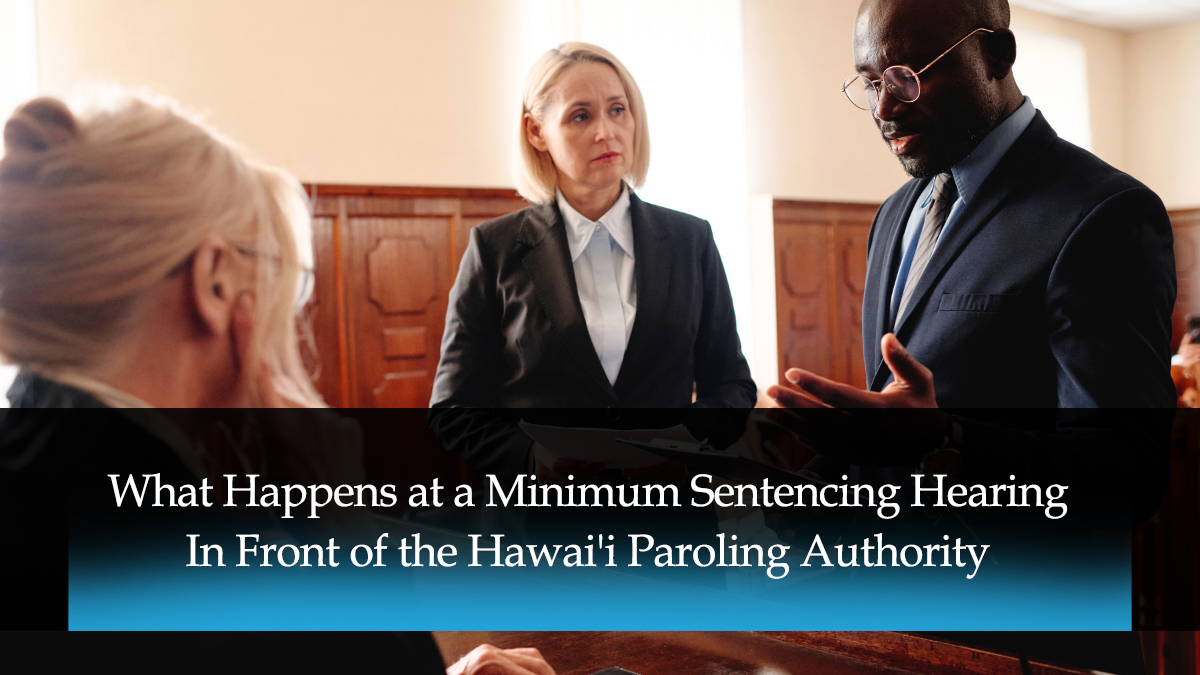If you are convicted of a felony in Hawai’i, the judge has several options for sentencing. If the judge sentences you to a term in prison, you will only learn your maximum prison sentence at your sentencing hearing in Court in front of the judge.
Hawai’i has a unique process for determining your minimum sentence, which controls how much time you actually spend behind bars. Within six months of your sentencing by the Court, the Hawai’i Paroling Authority will conduct a minimum sentencing hearing to set the minimum time you must serve before becoming eligible for parole.

Facing a minimum sentencing hearing in Hawai’i can feel overwhelming. It’s a pivotal moment that determines how much of your future might be spent behind bars. If you or a loved one is preparing for this hearing, you want to know what happens and how the minimum sentence is set.
Understanding what to expect can ease some of the anxiety and give you a clearer sense of what lies ahead.
Let’s walk through the process together, step by step, so you feel informed and ready to present your best case.
How Does the HPA’s Minimum Sentencing Hearing Work?
Sentencing hearings with the Hawai’i Paroling Authority (HPA) follow a structured process guided by administrative rules and sentencing guidelines.
These hearings determine the minimum term you must serve before you are eligible for parole.

Understanding this process can help you prepare effectively and advocate for a fair outcome.
The Purpose of the Sentencing Hearing
The HPA sentencing hearing establishes the minimum term of imprisonment for felony convictions.
After a defendant pleads guilty or is found guilty and receives a maximum term of imprisonment by the judge, the minimum sentencing hearing focuses on evaluating factors that influence an appropriate sentence.

The HPA is supposed to balance accountability with rehabilitation and public safety, ensuring the minimum sentence reflects both the nature of the crime and the defendant’s readiness to reintegrate into the community.
At the minimum sentencing hearing, the HPA should conduct a comprehensive review of the offense and the individual’s circumstances, ensuring that the punishment is consistent with Hawai’i’s sentencing guidelines.
What Happens During the Hearing
At the hearing, the HPA assesses multiple factors to set the appropriate minimum term.
The hearing occurs via video feed, with the defendant participating from the prison facility and the HPA panel members present in the HPA office. There can be numerous other people involved in the hearing and present on the video feed, including the prosecutor, the victim and/or their family members, defense witnesses, and others.
Both the prosecution and the defense can present witnesses and you will also be asked to address the HPA directly to share personal circumstances or rehabilitation efforts. Your input will hopefully help the panel members decide on a more lenient sentence.

The HPA’s rules say they must consider:
- The Nature of the Crime Committed: Violent crimes or offenses causing significant harm may lead to harsher sentences, while non-violent offenses might allow for more lenient terms.
- Criminal History: Prior convictions, patterns of behavior, and any history of repeat offenses weigh heavily in determining your sentence.
- Mitigating and Aggravating Factors: Mitigating factors, like first-time offender status or demonstrated remorse, can reduce your sentence. Aggravating factors, such as prior felony convictions or the severity of the harm caused, might result in a harsher sentence.
- Victim Impact Statements: These statements provide insight into the harm experienced by victims or their families. The HPA reviews these carefully when setting minimum terms.
If you’re preparing for a sentencing hearing with the Hawai’i Paroling Authority, contact the Law Office of Caroline M. Elliot.
We are here to protect your rights, guide you through the process, and work toward the best possible outcome.
Call us today at (808) 570-6003 for a FREE consultation and take the first step toward securing your future.

The Role of the Pre-Sentence Report
After you plead or are found guilty, the Court orders the probation department to prepare a pre-sentence report for the judge’s use at your sentencing hearing in front of the Court. This report can also be used by the HPA when establishing a minimum sentence. This report offers the HPA a detailed perspective on rehabilitation efforts and risks to public safety and outlines:
- The defendant’s conduct
- Criminal history
- Personal circumstances
The report may include:
- Behavior Before Trial or Sentencing: Whether you are held in custody pending trial or are released on supervision, participation in rehabilitation programs or vocational training is an important factor.
- Personal and Family Circumstances: Information about your background, including substance abuse history, employment, or family support.
- Impact of the Crime: Details on how the offense affected victims or the community.
Establishing the Minimum Term
After reviewing all relevant information, the HPA sets the minimum term of imprisonment based on its guidelines. These terms fall into three levels, categorized by the severity of the crime:
- Level I: Reserved for the least severe offenses.
- Level II: Applied to moderate-level offenses.
- Level III: Assigned to the most severe offenses.
The HPA’s decision is supposed to include specific findings to explain how the term was determined.
In some cases, you may later petition for a reduction of the minimum term through a formal request, especially if you can demonstrate significant rehabilitation or mitigating circumstances.
Why the Minimum Sentencing Hearing Matters
The minimum sentencing hearing sets the stage for your path forward in the justice system. It influences how soon you become eligible for parole and what the panel members want to see happen before your release.
By understanding the process and working with your attorney to present your case effectively, you can help ensure the HPA considers all factors that support a fair and just sentence.

Do Sentencing Guidelines Affect My Outcome in Hawai’i?
When you’re facing sentencing in Hawai’i, understanding how the HPA’s sentencing guidelines shape your outcome can provide clarity in an uncertain time.
These guidelines are not just a set of rules—they’re supposed to ensure consistency while balancing fairness, public safety, and your circumstances.
What Are the HPA’s Sentencing Guidelines?
The HPA’s sentencing guidelines are supposed to provide a framework for determining minimum terms of imprisonment and parole eligibility.
Established by the Hawai’i Paroling Authority (HPA), these guidelines are supposed to ensure fairness by categorizing offenses into three levels based on severity.
They help the judge or parole board weigh factors like the seriousness of the crime, the harm caused, and the defendant’s history.
For example, the HPA guidelines should consider whether the crime:
- Involved violence
- The defendant’s conduct prior to sentencing
- Whether mitigating or aggravating factors apply
If you’re convicted or plead guilty, these guidelines serve as a reference point for the HPA to decide what sentence fits your case.

The Sentencing Process in Hawai’i
At your minimum sentencing hearing, the panel members decide your minimum sentence based on the crime, your personal circumstances, and the sentencing guidelines.
The minimum sentencing hearing takes place via video feed in front of the panel members assigned to your case, where the prosecutor presents evidence supporting their recommendation, and your defense attorney argues for a fair outcome.
The HPA panel members consider the following during sentencing:
- Aggravating Factors: Actions or circumstances that could warrant a harsher sentence, like repeat felony convictions or violent crimes.
- Mitigating Factors: First-time offender status, remorse, or other personal circumstances that show potential for rehabilitation.
- Parole Considerations: The HPA guidelines emphasize rehabilitation. Demonstrating good behavior and progress prior to sentencing can influence future parole decisions.
Can the HPA’s Sentencing Guidelines Be Adjusted?
Sentencing guidelines in Hawai’i allow for discretion. The HPA acknowledges that not all cases fit neatly into predefined categories, giving the panel members room to consider alternative sentences.
For example, the guidelines allow flexibility for defendants who show rehabilitation or have faced extenuating circumstances.
The HPA can also review minimum terms of imprisonment through processes like the Request for Reduction of Minimum Terms.
This offers another opportunity for your case to be re-evaluated based on your conduct, participation in rehabilitation programs, and readiness to reintegrate into the community.

Why the HPA’s Sentencing Guidelines Matter
In Hawai’i, the sentencing guidelines provide a structured framework to determine your minimum sentence, but your individual circumstances still carry weight.
Whether it’s the details of the pre-sentence report or the arguments made by your attorney, every element affects how the panel members view your case.
By understanding these guidelines and how they intersect with your case, you can approach your minimum sentencing hearing with confidence.
With proper preparation and representation, the panel members can better recognize your progress and potential, offering a chance at a minimum sentence that balances accountability and a pathway to reintegration.

Robust Representation at Your Minimum Sentencing Hearing
At the Law Office of Caroline M. Elliot, you receive the guidance and support you need to navigate the Hawai’i Paroling Authority’s minimum sentencing process.
The minimum sentencing hearing is critical in your legal process and it can feel overwhelming, but you shouldn’t go through it alone.
With an experienced legal advocate by your side, you can approach this critical step with confidence and preparation.
Preparing for Your Hearing
Preparation is key to ensuring that the Hawai’i Paroling Authority sees the full picture of your case. We help you understand what to expect and build a strong foundation for your hearing by:
- Gathering Key Evidence: We work closely with you to collect records of good behavior, rehabilitation efforts, and other documents that support your case.
- Highlighting Mitigating Factors: Whether it’s a first-time offense, details of your family background,, or progress toward rehabilitation, we emphasize the details that matter.
- Clarifying the Process: We guide you through every step, from reviewing the pre-sentence report to understanding the HPA’s minimum sentencing guidelines.
Our goal is to help you present the strongest case possible, giving the HPA a clear view of your progress and readiness for release.
Advocating for a Fair Sentence
Your voice matters at your sentencing hearing, and we ensure it is heard. We focus on presenting your case in a way that highlights your efforts to move forward while addressing the crime’s circumstances. This includes:
- Addressing Aggravating and Mitigating Factors: We work to reduce the impact of aggravating factors and maximize the weight of mitigating factors.
- Challenging Inaccuracies: We make sure that the information the HPA panel members hear to determine your sentence is accurate to ensure fairness.
- Providing Comprehensive Support: Whether advocating for a lighter sentence or ensuring compliance with HPA guidelines, we remain committed to protecting your rights.
Why Your Representation Matters
The minimum sentencing hearing shapes your future, determining how long you’ll serve and when you become eligible for parole. Without the right representation, you risk missing critical opportunities to advocate for leniency or alternative sentences.
At the Law Office of Caroline M. Elliot, we ensure the HPA sees your case from every angle, giving you the best chance for a fair outcome.
Get the Support You Need Today
If you’re preparing for a minimum sentencing hearing with the Hawai’i Paroling Authority, contact the Law Office of Caroline M. Elliot.
We are here to protect your rights, guide you through the process, and work toward the best possible outcome.
Call us today at (808) 570-6003 for a FREE consultation and take the first step toward securing your future.

